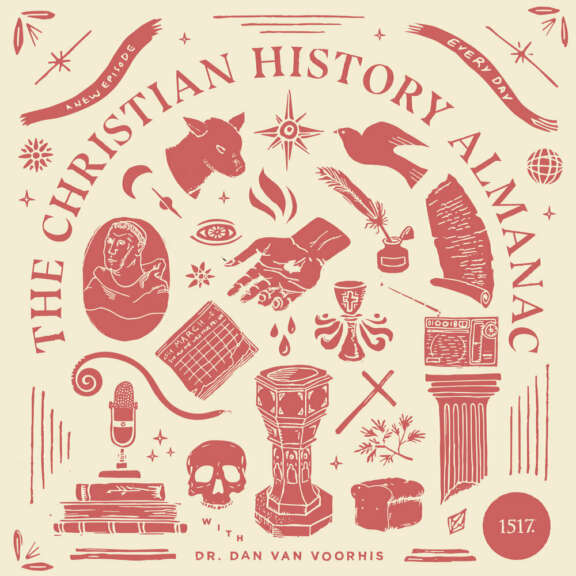Chairman Mao Loves Ice Cream. In this episode, G.K. Chesterton on what happens when we abolish God, and the government becomes the god. We discuss “unalienable rights endowed by the Creator.” The language of freedom and rights belongs to the law. And we finish with Chesterton’s prompt to consider fraud.
Podcasts
Each 1517 Podcast is dedicated to delivering Christ-centered content through weekly, monthly, and seasonal audio platforms. Listen online or on your favorite podcasting app.
Author
- All Authors
- Aaron Zimmerman
- Adam Francisco
- Amy Mantravadi
- Blake Flattley
- Bob Hiller
- Bradley Gray
- Brian W. Thomas
- Bror Erickson
- Bruce Hillman
- Caleb Keith
- Chad Bird
- Chris Rosebrough
- Christopher Gillespie
- Cindy Koch
- Craig Donofrio
- Dan van Voorhis
- Daniel Deen
- Daniel Emery Price
- Darrin Sheek
- David Andersen
- David Rufner
- David Zahl
- Debi Winrich
- Delwyn Campbell
- Donavon Riley
- Doug Klembara
- Edward Killian
- Elyse Fitzpatrick
- Erick Sorensen
- Flame
- Grant Klembara
- Gretchen Ronnevik
- Haroldo Camacho
- Jacob Smith
- Jared C. Wilson
- Jeff Mallinson
- Jeffrey Pulse
- Jessica Thompson
- Jim Nestingen
- Joel Fitzpatrick
- Joel Hess
- John Andrew Schreiner
- John Bombaro
- John T. Pless
- John W. Hoyum
- John Warwick Montgomery
- Kathy Morales
- Katie Koplin
- Kelsi Klembara
- Ken Sundet Jones
- Luke Kjolhaug
- Magnus Persson
- Mark Mattes
- Matt Popovits
- Michael Berg
- Michael Horton
- Nick Lannon
- Paul Koch
- Peter Nafzger
- Philip Bartelt
- Raleigh Sadler
- RJ Grunewald
- Robert Kolb
- Rod Rosenbladt
- Ron Hodel
- Sam Leanza Ortiz
- Sarah Condon
- Sarah Crowder
- Scott Davis
- Scott Keith
- Steven Paulson
- Tanner Olson
- Troy Neujahr
- Uwe Siemon-Netto
- Wade Johnston
- William Cwirla
-
The Pirates of Penance part 2. In this episode, we continue to examine Girolamo Savaronola’s sermon on penance. What happened in Florence that occasioned this sermon, and what can it teach us about church and society today?
-
The Pirates of Penance, part 1. In this episode, we look at pre-Reformation preaching. Girolamo Savaronola’s sermon on penance is read and discussed. What is penance, what effect did the sacrament of penance have on church and society, and what effect does it have on us at present?
-
It’s The Most Important Election of Our Lives, Until The Next Election. In this special election episode, Gillespie and Riley read David Whitford’s book, "Tyranny and Resistance," and discuss church, state, and the two kingdoms doctrine.
-
Stop Showing Off and Get Back in Line... In part two of our reading of Clement of Alexandria’s, The Praises of Martyrdom Those Who Offered Themselves for Martyrdom Reproved, we discuss when martyrdom isn’t martyrdom and why the topic is more relevant today than ever.
-
Easy There, Fella, Everybody’s Gonna Get a Turn... In this episode, we begin a reading of Clement of Alexandria’s, "The Praises of Martyrdom Those Who Offered Themselves for Martyrdom Reproved." What constitutes martyrdom for Christians? Where does the idea of martyrdom originate, and is it still a relevant topic for us today?
-
This isn't a plus one... The second part of our episode on Patrick Henry Reardon's book, Christ in the Psalms. Taking a hard look at how we confuse the two kingdoms, avoid controversial topics in the church and the tragic consequences of not taking everything captive to Christ.
-
This is not a drill... We return to Patrick Henry Reardon's book, Christ in the Psalms. In this episode, we consider Psalm 6 and the very real, earthly effects of God's wrath, along with political bookends.
-
My God can beat up your god... The second part of our discussion of Christ in the Psalms, by Patrick Henry Reardon. What is the temptation when Christians assume that our enemies are God's enemies? How do we pray for and against ourselves at the same time? What's happened to our piety that we are afraid to make demands of God?
-
Why Christians are commanded to pray down curses upon their enemies. This episode, Christ in the Psalms, by Patrick Henry Reardon. What's an imprecatory psalm? Why are we taught by Scripture to pray imprecatory psalms, but have largely excluded such prayers from our churches? How does psalm 5 point us to Jesus and culture simultaneously?
-
The year was 1927. We remember missionary and martyr Phillip James, or “Jim” Elliot. The reading is an excerpt from chapter 11 of the Epistle to the Hebrews.
-
The Enemies at the Gate. We conclude our reading and discussion of C.S. Lewis’ speech on Learning in War-time. More reflection on the three enemies, excitement, frustration, and fear.

